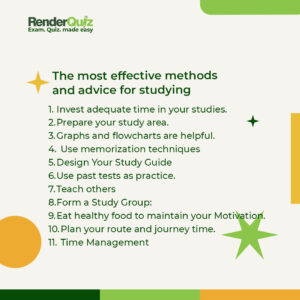Are you getting ready for exams? These top 11 study tips will help you get through and give yourself the best chance possible. Don’t allow the pressure to get to you; we’ve got you.
Introduction
Knowing how to study for examinations is beneficial when you’re working hard to acquire your degree in higher education because exams are a necessary component of the learning process.
There are strategies to increase your study time and efficiency to retain the material and perform well on exam day. While working hard and intelligently is crucial, taking appropriate study breaks is also helpful in preventing burnout, anxiety, or stress.
One of the most excellent methods to be ready for a test is to keep up with your work during the entire class from the start rather than putting it off until the night before. Studying for tests or exams gets more straightforward and less stressful if you take good notes, pay attention to the material, and review what you’ve learned each week.
Start learning effectively as soon as you step foot in a classroom. There are several ways to accomplish this:
- Ask the appropriate questions
- Pay close attention to the lesson.
- Start making detailed notes.
- Find out about the format of the exams.
If you’re enrolled in an online university, you may use the online forums in the classroom and still keep in touch with your professors and classmates over the internet to stay updated and make sure you grasp all the coursework.
Exams are stressful, but you can reduce that tension by enhancing your study techniques. You will feel prepared for your examinations if you study successfully and efficiently and will be better equipped to succeed.
When you’re ready to start studying, organizing your materials will be crucial to lowering your stress levels and getting you ready to learn.
Let’s look at some of the most effective methods and advice for studying; remember that you can do this.

1. Invest adequate time in your studies.
Although some students appear to thrive on last-minute cramming, it is generally agreed that there are better strategies for approaching an exam. Please don’t keep it until the last minute before you study.
Establish a schedule for your study time to aid with time management. Keep track of the number of exams you have and the dates you must take them, then set up your study in that manner. Find a balance that is comfortable for you. You should give some tests more study time than others.
2. Prepare your study area.
Make sure you have enough space, enough light, cosy chair and ensure you are as comfortable and able to focus as you can be by eliminating any distractions.
Some people may have near-total silence, while background music benefits others. Some may require things to be perfectly clean and ordered to focus, while others do better in a messier setting. Consider what works for you, and give it the attention it deserves.
3. Graphs and flowcharts are helpful.
When revising, visual aids can be quite beneficial. Write down all of the information you already know about a subject at the beginning of the topic, then identify any gaps. Reduce your review notes into one-page diagrams as the exam date approaches. Writing down your thoughts in this condensed style can make it easier for you to rapidly recollect all the information you need to know throughout the Exam.
4. Use memorization techniques:
You may improve your memory by using strategies like mnemonic devices and songwriting. When it comes to exam day, you can do a memory dump by noting everything before a test that you believe you need to remember (i.e. actual dates, formulas, etc.)
5. Design Your Study Guide:
You can make your study guide in whichever learning style you like, using the classroom notes and textbook. Creating a study guide will aid in helping you memorize the subject, just like flashcards do.
6. Use past tests as practice.
Taking previous tests is one of the best strategies to prepare for exams. This helps you become familiar with the question structure, and if you time yourself, it can also be good practice for making sure you give each portion the appropriate amount of attention.
7. Teach others
Leverage people around you and explain your response to them. This will aid your mental clarity and assist you in identifying any areas that require additional effort. Teaching others is one method to see how well you understand the subject. You can collaborate with your friends in a study group or online to determine what you truly know!
8. Form a Study Group:
Occasionally, learning in a group is the most excellent option! A study group can be beneficial since you will have a peer who may be able to teach you anything you don’t know, and you can also share knowledge by bouncing ideas off one another. They might have answers to your questions, and you might have the opposite. So, bring your pals together for a study session. It might be one of the best methods to challenge yourself, provided you pay attention to the subject for the allotted time.
9. Eat healthy food to maintain your Motivation.
Avoid junk food even though you might feel like you deserve a treat. Eat nutrient-rich meals that have been shown to improve memory and focus, such as fish, nuts, seeds, yoghurt, and blueberries. Sleep aids with memory retention, so you are sure to get enough of it and avoid pulling all-nighters.
10. Plan your route and journey time.
Check all the rules and requirements, and plan your route. Do a test run of the trip if it’s a physical location. You could also plan to travel to the Exam with friends or classmates – as long as you know they’re likely to be punctual. Make sure to prepare everything well in advance of the Exam; don’t wait until the last minute to find out you need to know where to go or what to bring.
11. Time Management
Every successful student understands the importance of time management. Rushing through an exam will make you more anxious and won’t give you enough time to process the material thoroughly. Find the best times to study instead, and get going early on the day of the Exam. Make sure to take your time, carefully review the questions, and begin by responding to the simplest ones first. The most crucial thing is to get as many correct answers as possible in the allotted time. You can mark the questions that are challenging and return to them.
Conclusion

The bottom line is that there are better approaches to preparing for an exam. But there are many methods to make the most of your time and be ready for your exam of test paper. You can tailor your study pattern to suit your preferences, whether learning in a group or by yourself, preparing flashcards or watching videos, going over the textbook or writing your study guide. Take short study time breaks to re-energize and attend to your overall well-being to be at your best on the exam day.
Good Luck!
“Striving for success without hard work is like trying to harvest where you haven’t planted.”
― David Bly, American politician
